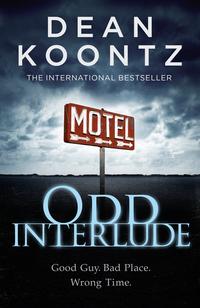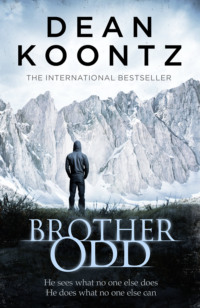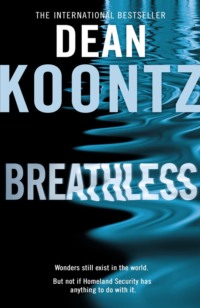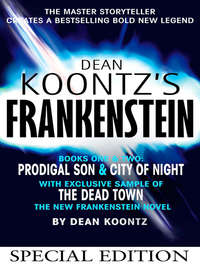
Полная версия
The Face
Fric wasn’t able to phone his Nominal Mom, Freddie Nielander, because she would be in some far and fabulously glamorous place like Monte Carlo, being gorgeous. He didn’t have a reliable phone number for her.
Mrs. McBee, and by extension Mr. McBee, were kind to Fric. They seemed to have his best interests always in mind.
Nevertheless, Fric was reluctant to turn to them in a case like this. Mr. McBee was just a little … daffy. And Mrs. McBee was an all-knowing, all-seeing, rule-making, formidable woman whose soft-spoken words and mere looks of disapproval were powerful enough to cause the object of her reprimand to suffer internal bleeding.
Mr. and Mrs. McBee served in loco parentis. This was a Latin legal phrase that meant they had been given the authority of Fric’s parents when his parents were absent, which was nearly always.
When he’d first heard in loco parentis, he’d thought it meant that his parents were loco.
The McBees, however, had come with the house, which they had managed long before Ghost Dad had owned it. To Fric, their deeper allegiance seemed to be to Palazzo Rospo, to place and to tradition, more than to any single employer or his family.
Mr. Baptiste, the happy cook, was a friendly acquaintance, not actually a friend, and certainly not a confidant.
Mr. Hachette, the fearsome and possibly insane chef, was not a person to whom anyone would turn in time of need, except perhaps Satan. The Prince of Hell would value the chef’s advice.
Fric carefully planned every foray into the kitchen so as to avoid Mr. Hachette. Garlic wouldn’t repel the chef, because he loved garlic, but a crucifix pressed to his flesh would surely cause him to burst into flames and, screaming, to take flight like a bat.
The possibility existed that the psychotic chef was the very danger about which Mysterious Caller had been warning Fric.
Indeed, virtually any of the twenty-five staff members might be a scheming homicidal nutjob cunningly concealed behind a smiley mask. An ax murderer. An ice-pick killer. A silk-scarf strangler.
Maybe all twenty-five were ax murderers waiting to strike. Maybe the next full moon would stir tides of madness in their heads, and they would explode simultaneously, committing hideous acts of bloody violence, attacking one another with guns, hatchets, and high-speed food processors.
If you couldn’t know the full truth of what your father and your mother thought of you, if you couldn’t really know who they were and what went on inside their heads, then you couldn’t expect to know for sure anything about other people who were even less close to you.
Fric pretty much trusted Mr. Truman not to be a psychopath with a chain-saw obsession. Mr. Truman had once been a cop, after all.
Besides, something about Ethan Truman was so right. Fric didn’t have the words to describe it, but he recognized it. Mr. Truman was solid. When he came into a room, he was there. When he talked to you, he was connected to you.
Fric had never known anyone quite like him.
Nevertheless, he wouldn’t tell even Mr. Truman about Mysterious Caller and the need to find a hiding place.
For one thing, he feared not being believed. Boys his age often made up wild stories. Not Fric. But other boys did. Fric didn’t want Mr. Truman to think he was a lying sack of kid crap.
Neither did he want Mr. Truman to think that he was a fraidy-cat, a spineless jellyfish, a chicken-hearted coward.
No one would ever believe that Fric could save the world twenty times over, the way they believed his father had done, but he didn’t want anyone to think he was a timid baby. Especially not Mr. Truman.
Besides, he sort of liked having this secret. It was better than trains.
He watched the wet day, half expecting to catch a brief glimpse of a villain skulking across the estate, obscured by rain and mist.
After Mysterious Caller’s number had rung maybe a hundred times without being answered, Fric returned to the phone and terminated the call.
He had work to do. Preparations to make.
A bad thing was coming. Fric intended to be ready to meet it, greet it, defeat it.
CHAPTER 19
UNDER A BLACK UMBRELLA, ETHAN Truman walked the grassy avenue of graves, his shoes squishing in the saturated turf.
Giant drooping cedars mourned with the weeping day, and birds, like spirits risen, stirred in the cloistered branches when he passed near enough to worry them.
As far as he could see, he alone walked in these mortal fields. Respect for the loved and lost was usually paid on sunny days, with remembrances as bright as the weather. No one would choose to visit a cemetery in a storm.
No one but a cop whose mainspring of curiosity had been wound tight, who had been born with a compulsive need to know the truth. A clockwork mechanism in his heart and soul, designed by fate and granted as a birthright, compelled him to follow wherever suspicion and logic might lead.
In this case, suspicion, logic, and dread.
Intuition wove in him the strange conviction that he would prove to be not the first visitor of the day and that in this bastion of the dead, he would discover something disturbing, though he had no idea what it might be.
Headstones of time-eaten granite, mausoleums crusted with lichen and stained by settled smog, memorial columns and obelisks tilted by ground subsidence: None of that traditional architecture identified this as a cemetery. The marker at each of these graves—a bronze plaque on a pale granite plinth—had been set flush with the grass. From a distance the burial ground appeared to be an ordinary park.
Radiant and unique in life, Hannah was here remembered with the same drab bronze that memorialized the thousands of others who slept eternal in these fields.
Ethan visited her grave six or seven times a year, including once at Christmas. And always on their anniversary.
He didn’t know why he came that often. Hannah didn’t lie here, only her bones. She lived in his heart, always with him.
Sometimes he thought he traveled to this place less to remember her—for she was not in the least forgotten—than to gaze at the empty plot beside her, at the blank granite tablet on which a cast-bronze plaque with his name would one day be fixed.
At thirty-seven, he was too young a man to welcome death, and life continued to hold the greater promise for him. Nevertheless, five years after losing Hannah, Ethan still felt that something of himself had died, as well.
Through twelve years of marriage, they delayed having children. They had been so young. No need to hurry.
No one expected a vibrant, beautiful, thirty-two-year-old woman to be diagnosed with a virulent cancer, to be dead four months later. When it took her, the malignancy also claimed the children they might have brought into the world, and the grandchildren thereafter.
In a sense, Ethan had died with her: the Ethan who would have been a loving father to the children blessed with her grace, the Ethan who would have known the joy of her company for decades yet to come, who would have known the peace and the purpose of growing old at her side.
Perhaps he would have been surprised to find her grave torn open, empty.
What he found instead of grave robbery, though unexpected, did not surprise him.
At the base of her bronze plaque lay two dozen fresh long-stemmed roses. The florist had wrapped them in a cone of stiff cellophane that partly protected the blooms from the pelting rain.
These were hybrid tea roses, a golden-red variety named Broadway. Of all the roses that Hannah loved and grew, Broadway had been her favorite.
Ethan turned slowly in a full circle, studying the cemetery. No figure moved anywhere on those gently sloped green acres.
He peered with special suspicion at every cedar, every oak. As best he could tell, those trunks didn’t shelter a lurking observer.
No traffic moved on the narrow winding road that served the cemetery. Ethan’s Expedition—white as winter, glimmering like ice—was the only vehicle parked along the lane.
Beyond the boundaries of the cemetery, urban vistas loomed in veils of rain and fog, less like a real city than like a metropolis in a dream. No rumble of traffic, no bleat of horn penetrated from its maze of streets, as though all its citizens had long ago gone horizontal in these silent grassy acres surrounding Ethan.
He looked down at the bouquet once more. In addition to bright color, the Broadway rose offers a fine fragrance. It flourishes in any sun-drenched garden and is more resistant to mildew than are many other varieties.
Two dozen roses found on a grave would not be admitted as evidence in a court of law. Yet Ethan regarded these colorful blooms as proof enough of a strange courtship of the dead, by the dead.
CHAPTER 20
EATING A MAMOUL, WASHING IT DOWN with coffee from a thermos, Hazard Yancy sat in an unmarked sedan directly in front of Rolf Reynerd’s apartment house in West Hollywood.
The early winter twilight would not descend for another thirty minutes, but under the pall of the storm, the city had an hour ago settled into a prolonged dusk. Activated by photoelectric sensors, streetlamps glowed, painting a steely sheen on the needles of rain that stitched the gauzy gray sky ever closer to the earth.
Although it might appear that Hazard lingered over cookies on the city’s time, he was considering his approach to Reynerd.
After lunch with Ethan, he had returned to his desk in Homicide. In a couple hours, on the Internet and off, working both the keyboard and the phone, he had learned more than a little about his subject.
Rolf Reynerd was an actor who only intermittently made a living at his craft. Between occasional multi-episode supporting roles as a bad boy on one cheesy soap opera or another, he endured long periods of unemployment.
In an episode of The X-Files, he’d played a federal agent driven psychotic by an alien brain leech. In an episode of Law & Order, he had been a psychotic personal trainer who killed himself and his wife near the end of the first act. In a TV commercial for a deodorant, he had been cast as a psychotic guard in a Soviet gulag; the spot had never gone national, and he’d made only a little money from it.
An actor unlucky enough to be typecast usually didn’t fall into that career trap until he’d experienced great success in a memorable role. Thereafter, the public had difficulty accepting him as any character type other than the one that had made him famous.
In Reynerd’s case, however, he seemed to have been typecast even in failure. This suggested to Hazard that certain qualities of the man’s personality and demeanor allowed him to portray only mentally unbalanced characters, that he played screw-loose well because several of his own screws had stripped threads.
Despite an unreliable flow of income, Rolf Reynerd lived in a spacious apartment in a handsome building, in a good neighborhood. He dressed well, frequented the hottest nightclubs with young actresses who had a taste for Dom Perignon, and drove a new Jaguar.
According to former friends of Reynerd’s widowed mother, Mina, she doted on her son, believed that one day he would be a star, and subsidized him with a fat monthly check.
They were her former friends because Mina Reynerd had died four months ago. She’d first been shot in the foot, then beaten to death with a marble lamp encrusted with ornate ormolu mountings.
Her killer remained unknown. Detectives had turned up no leads in her case.
Not surprisingly, the sole heir to her estate had been her only child, poor typecast Rolf.
The actor had a dead-solid perfect alibi for the evening of his mother’s murder.
This didn’t either surprise Hazard or convince him of Reynerd’s innocence. Sole heirs usually had airtight alibis.
According to the medical examiner, Mina had been bludgeoned to death between 9:00 and 11:00 p.m. She’d been struck with such brutal force that patterns of the bronze ormolu had been deeply imprinted on her flesh, even crushed into the bone of her forehead.
Rolf had been partying with his current girlfriend and four other couples from seven o’clock that evening until two o’clock in the morning. They had been a flashy, noisy, memorable group at the two trendy nightclubs between which they had divided their time.
Anyway, even though Mina’s murder remained unsolved, and even if Rolf’s alibi had been only that he’d stayed home alone, playing with himself, Hazard would have had no excuse to give the man a once-over. The case belonged to another detective.
By happy chance, one of Reynerd’s party pals that night—Jerry Nemo—was known to Hazard from another case, which opened a door.
Two months ago, a drug dealer named Carter Cook had been shot in the head. Apparently the murder had been incidental to robbery; Cook had been loaded with merchandise and cash.
Reynerd’s buddy, Jerry Nemo, had placed a call to Cook’s cell phone an hour before the murder. Nemo was a customer, a cokehead. He set up a meet with Cook to score some blow.
Nemo was no longer under suspicion. No one in Los Angeles or anywhere on Planet Earth was still under suspicion. The Cook murder qualified as classic shitcan, a case unlikely ever to be solved.
Nevertheless, by pretending that Nemo remained a suspect, Hazard had an excuse to approach Reynerd and scope him out for Ethan.
He didn’t need an excuse for the purpose of satisfying Reynerd. Using just badge and bluster, Hazard could spin a hundred stories convincing enough to persuade the party boy to open the door and answer questions.
Конец ознакомительного фрагмента.
Текст предоставлен ООО «ЛитРес».
Прочитайте эту книгу целиком, купив полную легальную версию на ЛитРес.
Безопасно оплатить книгу можно банковской картой Visa, MasterCard, Maestro, со счета мобильного телефона, с платежного терминала, в салоне МТС или Связной, через PayPal, WebMoney, Яндекс.Деньги, QIWI Кошелек, бонусными картами или другим удобным Вам способом.







